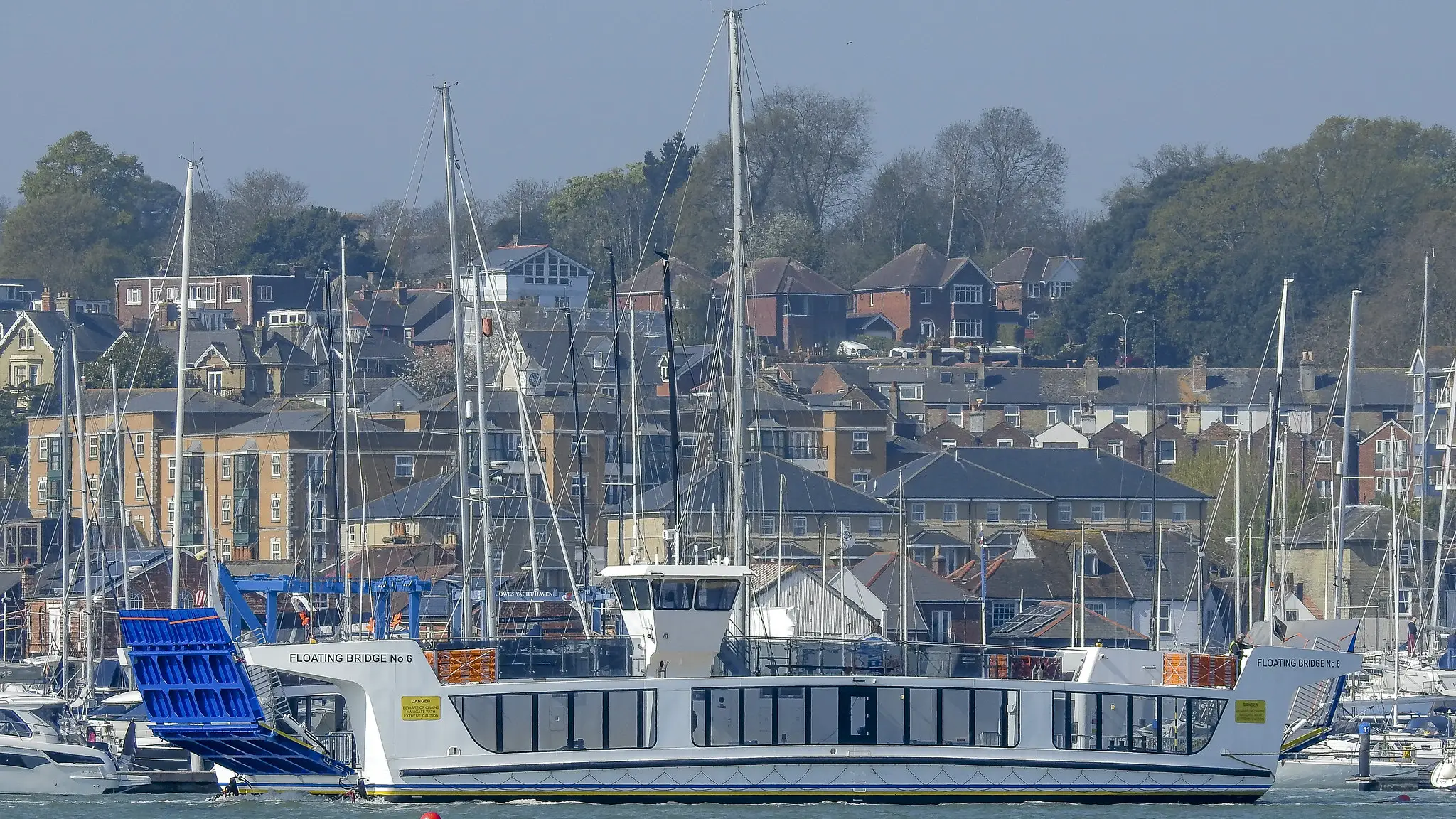As reported by News OnTheWight back in October, a Cabinet Office Gateway Five review of the Floating Bridge 6 project was commissioned, as requested by funders of the new Floating Bridge, the Solent LEP.
That review has now been completed and will be presented at next week’s Cabinet meeting, along with a range of recommendations (see below)
Significant reliability problems
Whilst acknowledging that the project has experienced significant reliability problems and associated repair costs since it first became operational, the Gateway Five Review Team found that the significant issues which already exist are now receiving management attention.
A number of recommendations have been set out in the Review, which Cabinet member for transport and infrastructure, Phil Jordan, says the council are “happy to accept, support, and confirm we will be carrying out”.
‘Amber’ confidence assessment
The review states that the FB6 project has been rated as Amber as part of the ‘Delivery Confidence Assessment’. This is defined as:
“Successful delivery appears feasible but significant issues already exist requiring management attention. These appear resolvable at this stage and if addressed promptly, should not present a cost/schedule overrun.”
Summary of Gateway Five Review recommendations
For those interested in more detail, a full explanation of the recommendations can be found under this table (jump to detail) as set out by the Gateway Five Review team.
| The proposed modifications to the prows and hydraulic rams should be checked and reviewed by a competent, independent third-party engineer. | Critical |
| An annual testing regime should be put in place to check for fatigue cracking in the critical areas of the hinges and the ram attachment points. | Recommended |
| Advice should be sought from a competent third-party engineer regarding planned modifications and upgrades. | Essential |
| A new O&M manual should be written specifically covering the hydraulic system. This should be supplemented by a new hydraulic schematic with full parts list supplied therein. | Essential |
| The Council should seek advice regarding an appropriate strategic and tactical spares list and spares availability/storage strategy from a competent, independent third-party engineer. | Essential |
| A comprehensive review, to include taking into account work done to date, should be undertaken to assess the feasibility of options to address how the floating bridge may be operated in peak tidal flows whilst achieving the required chain clearances and other options including suspending the floating bridge operation and managing river traffic | Essential |
| The Council should train and appoint Duty Managers for FB6 so that a Duty Manager is always on shift during operating hours to act as a first responder and alleviate the demands currently placed on FB6’s Manager. | Essential |
| The Council should develop a succession plan to transfer the knowledge and learning accumulated by the current Strategic Manager responsible for FB6 in order to train a replacement for him in the event that he should no longer be available to be called upon by the Council. | Essential |
| For resilience, the Council should satisfy itself it can obtain in a timely fashion, the services of expert technical and other professionals as may be needed in the future and on an ongoing basis in respect of the continuing operation of FB6. An assessment of the different routes to market already available to the Council (including any suitable framework agreements) should be undertaken in respect of each distinct service requirement in order to inform the Council’s procurement strategy for having its future needs met. | Recommended |
| The Council should satisfy itself that it has all the information it needs in respect of the matters relevant to the dispute to make good settlement decisions | Essential |
Critical (Do Now) – To increase the likelihood of a successful outcome it is of the greatest importance that the programme/project should take action immediately.
Essential (Do By) – To increase the likelihood of a successful outcome the programme/project should take action in the near future.
Recommended – The programme/project should benefit from the uptake of this recommendation.
Detail of recommendations
Full detail for each recommendation can be found below. As stated in the Gateway Five report to the Isle of Wight council.
Recommendation 1
The proposed modifications to the prows and hydraulic rams should be checked and reviewed by a competent, independent third-party engineer.
The review team understands that Marico marine engineers have been employed to oversee the works to be undertaken next year in Wight Shipyard and at Falmouth Dry Dock.
Recommendation 2
An annual testing regime should be put in place to check for fatigue cracking in the critical areas of the hinges and the ram attachment points.
3.1.2 Hydraulic System
The review team understands that a range of modifications and upgrades are being carried out by AP Hydraulics (AP). These include modifications to the braking system, drive system and pump and filtration systems. The review team was also informed that further proposed modifications include improvements to the hydraulic control of the brakes and the introduction of proportional flow joysticks to control the speed of the prows. It is understood that return to service training is planned for the crew in regard to the modifications and new control measures.
Recommendation 3
Advice should be sought from a competent third-party engineer regarding planned modifications and upgrades.
Recommendation 4
A new O&M manual should be written specifically covering the hydraulic system. This should be supplemented by a new hydraulic schematic with full parts list supplied therein.
3.1.3 Spares lists
The review team was made aware of the importance of spares’ availability and spares’ holding for the effective future service provision with high percentage bridge availability. Identification of critical spares and ensuring that these are readily available at very short notice was identified as key to the minimisation of downtime. Treating these parts as strategic spares incorporated into planned maintenance regimes will reduce the risk of these factors affecting bridge availability.
Recommendation 5
The Council should seek advice regarding an appropriate strategic and tactical spares list and spares availability/storage strategy from a competent, independent third-party engineer.
3.1.4 Chain clearance
The review team was made aware of previous studies which considered potential options to address the issues associated with operation of the floating bridge during periods of strong tidal currents. In addition to deployment of a push boat, it is understood that studies considered potential options to:
- provide physical support/restraint at slipway positions to enable the floating bridge to be berthed in a manner which does not lead to the chains being put under tension and thus be raised to a higher elevation
- suspend upstream/downstream navigation by river traffic during peak tidal flows when desired chain clearances cannot be achieved
- suspend operation of the floating bridge during peak tidal flows when desired chain clearances cannot be achieved
- provide a ‘check chain’ or line, to restrain the floating bridge against lateral displacement.
Recommendation 6
A comprehensive review, to include taking into account work done to date, should be undertaken to assess the feasibility of options to address how the floating bridge may be operated in peak tidal flows whilst achieving the required chain clearances and other options including suspending the floating bridge operation and managing river traffic.
3.2 Resourcing and governance
The review team recognised the importance of having adequate resources to manage the FB6 project and oversee its day-to-day operation. While it is encouraging that an Assistant Technical Officer has been appointed to support the existing FB6 Technical Officer, it is recognised that more senior officers with responsibility for FB6 are stretched and there is a lack of contingency to cover leave, sickness and other absences. Furthermore, detailed knowledge of the FB6 project is held by a small number of individuals. The Council should take immediate action to build resilience in the operation of FB6, reduce reliance on the goodwill of Council staff, and to develop a succession plan.
Recommendation 7
The Council should train and appoint Duty Managers for FB6 so that a Duty Manager is always on shift during operating hours to act as a first responder and alleviate the demands currently placed on FB6’s Manager.
Recommendation 8
The Council should develop a succession plan to transfer the knowledge and learning accumulated by the current Strategic Manager responsible for FB6 in order to train a replacement for him in the event that he should no longer be available to be called upon by the Council.
3.3 Ongoing and future access to external expert technical and other professional advice
It was apparent from interviews and documentary evidence that the Council has needed to obtain from the market, expert technical and other professional advice from time to time to fully understand the nature of the defects that have materialised in the operation of FB6 and to identify appropriate solutions. Having ready access to such expertise is critical if the Council is to identify the cause of any such issues should they arise in the future and to be able to take remedial steps in as timely a manner as possible.
Recommendation 9
For resilience, the Council should satisfy itself it can obtain in a timely fashion, the services of expert technical and other professionals as may be needed in the future and on an ongoing basis in respect of the continuing operation of FB6. An assessment of the different routes to market already available to the Council (including any suitable framework agreements) should be undertaken in respect of each distinct service requirement in order to inform the Council’s procurement strategy for having its future needs met.
3.4 Identification of all matters relevant to mediation
The review team is aware that the Council is planning to undertake mediation with the shipbuilder and naval architect with a view to resolving the matters in dispute. It is understood the points in dispute have arisen over a period of time, with some matters only coming to the attention of the Council fairly recently. This could potentially suggest there are other underlying faults within FB6 not yet known to the Council and which would be pertinent to the mediation process in which the other parties can be expected to seek a full and final settlement. A system reliability analysis could be used for this purpose. In order to build confidence levels and provide assurance of both overall reliability and the potential for further latent defects, it is suggested that the Council could appoint an appropriately qualified organisation to undertake a technical Reliability Assessment of the electrical and mechanical systems of FB6 based on established engineering and risk methodologies such as Failure Modes and Effects Analysis (FMEA) and Hazard and Operability Studies (HAZOP).
Recommendation 10
The Council should satisfy itself that it has all the information it needs in respect of the matters relevant to the dispute to make good settlement decisions.
3.5 What would be the implications of a re-procurement?
Whilst interviews revealed some consideration of, but no current activity, to replace the floating bridge solution through a re-procurement exercise, any active consideration of such a plan will need to be undertaken in the knowledge that it will involve a lengthy and complex exercise. It would require in particular the following: revalidation of the business need and required outcomes, revalidation of the appropriate delivery model and contracting structure, identification of lessons learned from FB6 to inform future approaches, pre-procurement market engagement to assess the health and capacity of the market and help shape the Council’s requirements in line with the latest best practice (see Government’s Playbooks1), assembling a dedicated and well-resourced project delivery team (supplemented by external advisers as appropriate) to support successful delivery of a robust procurement and consideration of appropriate governance arrangements for Council oversight and direction. In parallel, a suitably skilled and resourced contract management team will continue to be needed to ensure FB6 delivers against its required outcomes and to address any future interruption in the FB6 service.
No further Local Partnerships Gateway Reviews are expected as this is a Gate 5 review. However, we believe that there might be merit in reviewing progress at some future point should the Council require an independent review.
Image: © Les Lockhart





